Thing is, I like working from scripts. I don’t much care what format the script comes in, or whether it’s in the right order, and I’m never averse to suggesting abstractions or deletions; but the bottom line is: I’m a massive scaredy-cat at devising content in rehearsals and I like working from scripts.
This seems to surprise people who know me and know my work. In part this is probably because I collaborate principally with one writer. But I’ve also had people respond to rehearsed readings I’ve directed of other writers’ work as “making it hard to judge the script because you can’t see where the script ends and the production decisions begin.”
To me, the lack of perceptible join between script and production feels like a huge success. The fact that we could get to that point in less than 3 days, with a company who largely did not know each other, demonstrates how focussed and clear that script was. I think we cut one word only – and that was at the writer’s suggestion. I wanted to apply a particular aesthetic take on how we approached the script – I was thinking 1990s American indie movies (notably Hal Hartley films) – and once we’d agreed what we meant by that, we all just let the script sing through that lens. It turned a 30 minute script into an hour long work in progress, which might sound like a bad thing (you made it longer?!?) but we revealed an intensity in that story that the writer had never seen expressed in previous workshop productions of her script.
At the time, I really needed this confidence boost. I’d had a couple of much shakier experiences in the months before, where I’d felt that I couldn’t properly lead my approach to the projects I’d been invited into. In the first case, I’d been asked to test an approach I didn’t think would suit the piece. The important thing was that the company soon recognized it wasn’t the right route to take and the piece returned to its original aesthetic; but it still irks me that I didn’t have the confidence to trust my instincts and either turn down the gig, or rebel on the brief I was given and use that time to help the company hone their original aesthetic. The second difficult experience was with a big and complex collaboration, where the schedule meant that decisions about site, design and casting were made without me overseeing them. The Creative Director of the project, who was also the writer, had a very clear and passionate vision for it, which conflicted with aesthetic choices that I would have made. You can’t steer a piece in two different directions, so I decided to step down from directing and assist the Creative Director instead. Setting aside the personal guilt of feeling like I bottled it and let people down, I know it was the right decision to make for the good of the project. And it sent a rocket up my understanding of what sort of director I am, in a good way.
When I think about theatre, I think about space: the space we’re in together. Proximity, implication, the weird and intangible sensory hyperawarenesses that occurs when you invite people to pay attention in public. I’m not a technically trained director. My training comes from having seen loads of very different performance-type-gig-type-theatre-type stuff, loving the intensity of live experiences, and listening to loads of different artists about how they make their work. As a result, my approach as a director is led by my experience as an audience-member.
Which brings me back to why I think people assume I’m not a script-led director. I think this experience-led approach to theatremaking is much more associated with devised theatre, dance and live art. But for me, directing a script is not about presenting the script in its ‘truest’ form. It’s much less academic. It’s about inviting you to feel something. Some people might find that naïve or sentimental, but I love it when an art thing gets under my skin and makes me feel stuff before I think stuff.
Thinking this out makes me want start ranting about the (to my mind) false divide between “theatre” and “performance” which you might also know as “traditional” vs “experimental” or “pretend” vs “authentic” but I’ll save that for another time.
Theatre is an amount of time, with people, in space. You can fill it with anything. The space is an instrument. I like building in sound. I like stealing from films. I like working from scripts.

